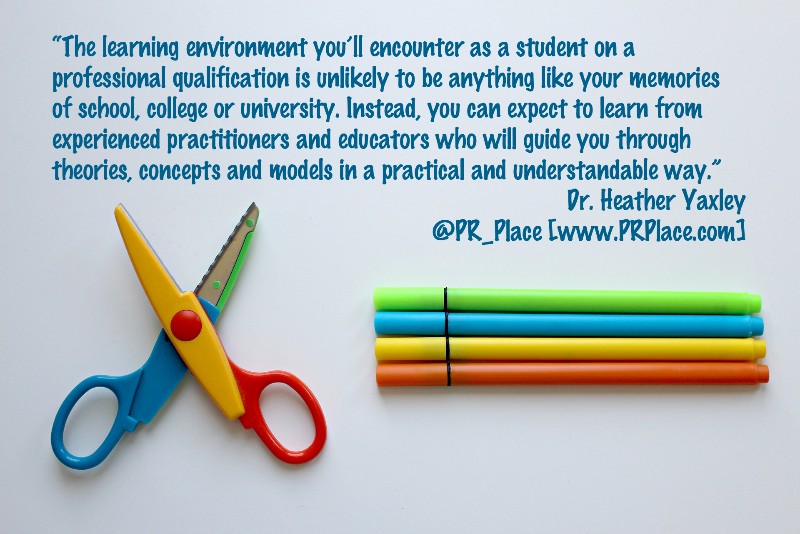Back to School – Should you study for a professional qualification?

About the author
Heather is a key member of our assessor team. PhD, BSc, PG, RSA, CAM

If you’ve been thinking about gaining a professional qualification, this Ask Dr Heather Yaxley feature will help you decide if this is the right option for you. If you have additional questions, please comment below and Dr Yaxley will be happy to respond.
Q. I’ve been considering the CIPR qualifications but how do I know which one is the best for me?
A. CIPR offers a suite of qualifications that are designed to support particular career development needs. The first step is to have a good look at the course details provided on the CIPR’s website or that of one of the delivery centres, such as PR Academy. This will help you to narrow down between Foundation, Certificate and Diploma levels, and decide whether you wish to gain a broad understanding of PR/communications or a specialist qualification, currently available in Internal Communications, Public Affairs or Crisis Communications. Make a note of any questions you have after looking at the options and contact your preferred delivery centre who will be able to answer these and explain further how the courses work.
Q. I would like to ask my employer to support me if I decide to study for a professional qualification. What sort of support do employers offer – and what would they expect from me in return?
A. It is a good idea to discuss your intention to study with your employer in advance and agree how they can support you and the benefits you will bring to your role as a result. If you are looking for financial support, some employers may be willing to offer full or part payment of course fees, reimburse travel costs or set aside budget for books. Be clear about the funding you would need, when and how this has to be paid. Check any terms or conditions, such as penalties if you leave the company early or do not complete the course successful. If funds are not available, then consider asking for additional leave for working on assignments, flexitime in lieu of attending classes or a few hours during the working week as personal study time. You may also benefit from a mentor to help support your studies. In turn, be willing to share learning from your studies and apply your new knowledge and skills at work.
Q. I’ve been out of education for a long time and am nervous about returning to study. How can I ensure that I won’t feel out of my depth as a ‘mature’ student?
A. Relax. The learning environment you’ll encounter as a student on a professional qualification is unlikely to be anything like your memories of school, college or university. Instead, you can expect to learn from experienced practitioners and educators who will guide you through theories, concepts and models in a practical and understandable way. As part of a diverse group of students, you will be able to share your own experiences, analyse case studies, and build upon your existing capabilities.
Assignments are often work-based and practical in focus, whilst enabling you to apply critical thinking to real world situations.
Q. What value do professionals get from returning to education when they’ve already proved they can do the job?
A. I am undertaking a research project into this very question. Initial results highlight a number of personal and professional benefits. These range from greater levels of confidence, an end to feeling an ‘imposter’ in their job, and gaining legitimacy to work with executives and lead strategic projects. Other people have told me that they have are better equipped to tackle a range of situations, and have been promoted into trusted adviser roles where they draw on the body of knowledge and evidence of effective and ethical practices, Career development includes promotions and new opportunities as qualifications are recognised increasingly as a commitment to professional development by employers. Then there’s the personal satisfaction of having achieved something that many people are not even willing to attempt, and setting yourself apart in your chosen occupation.